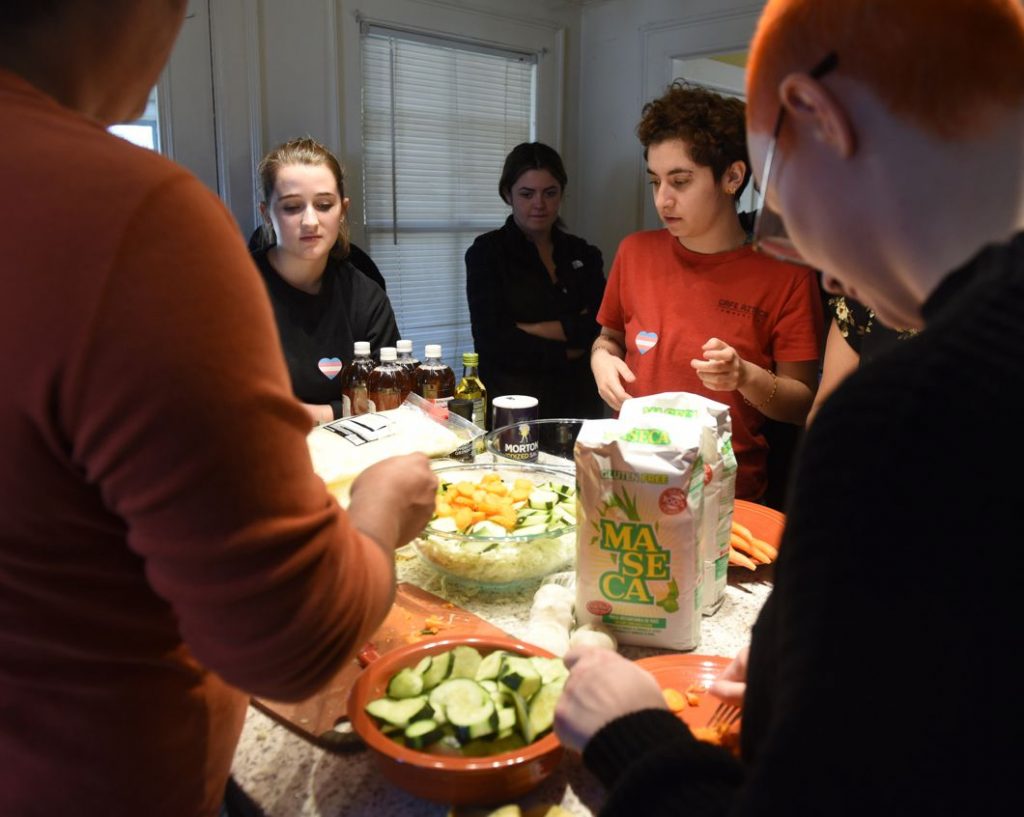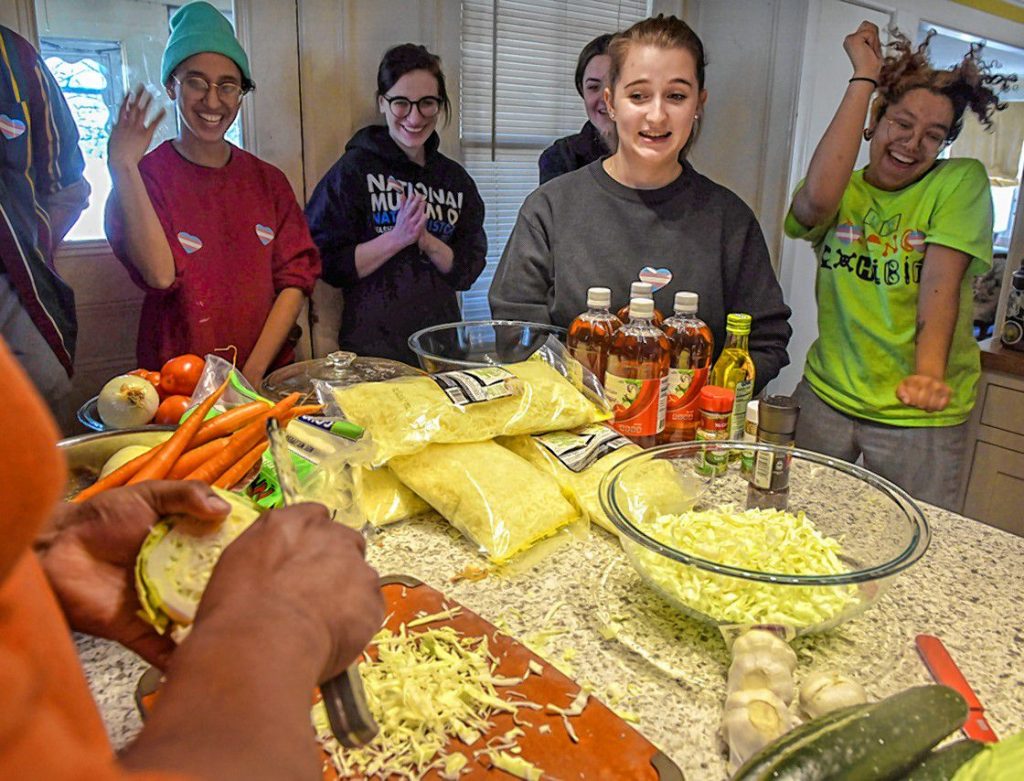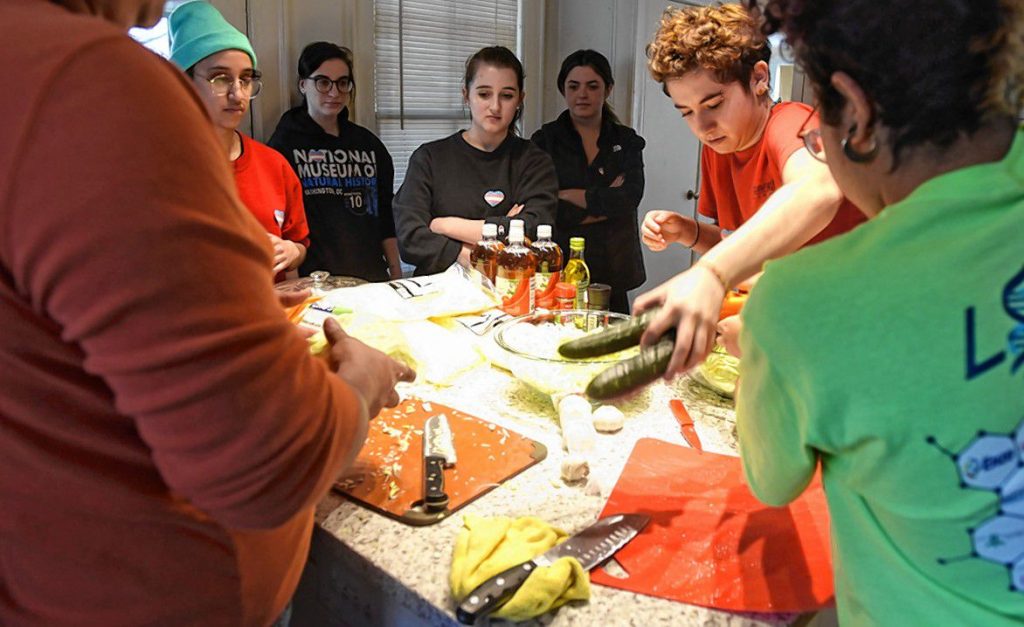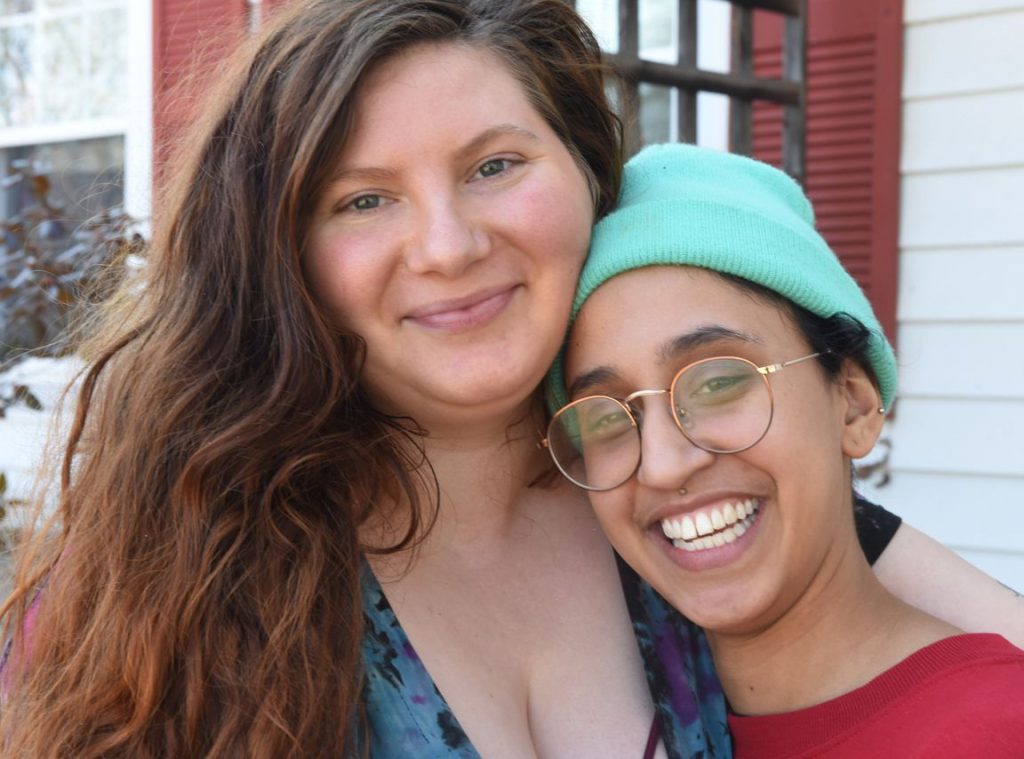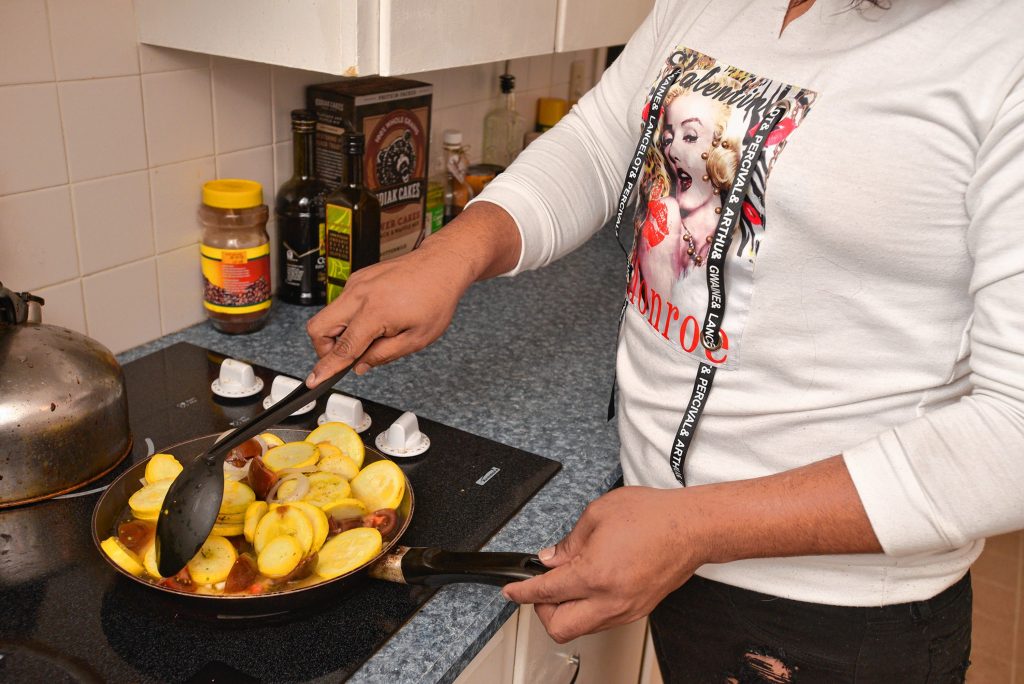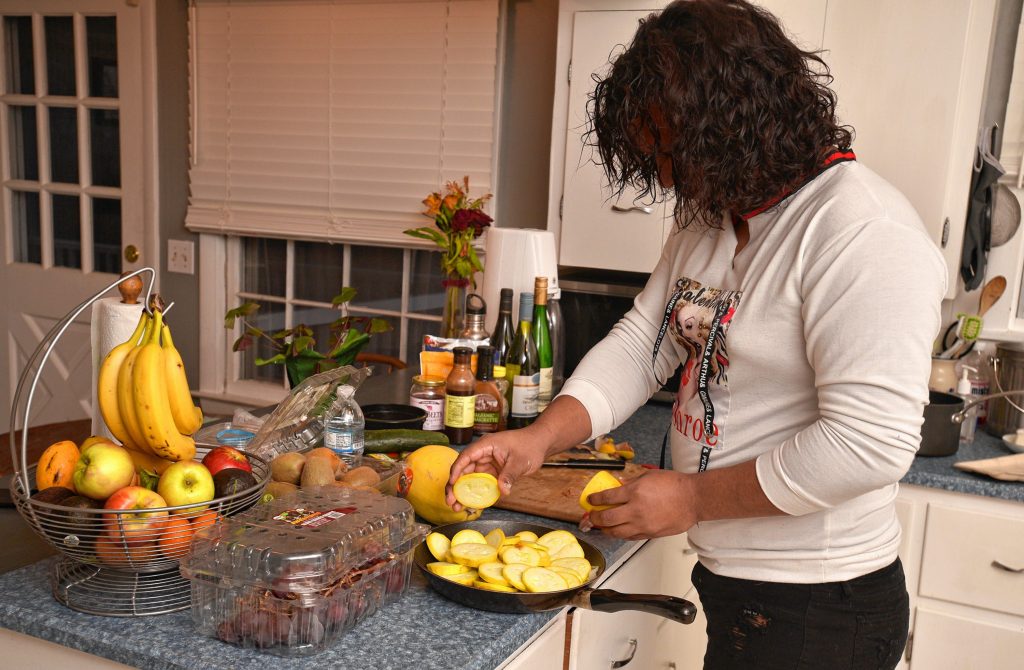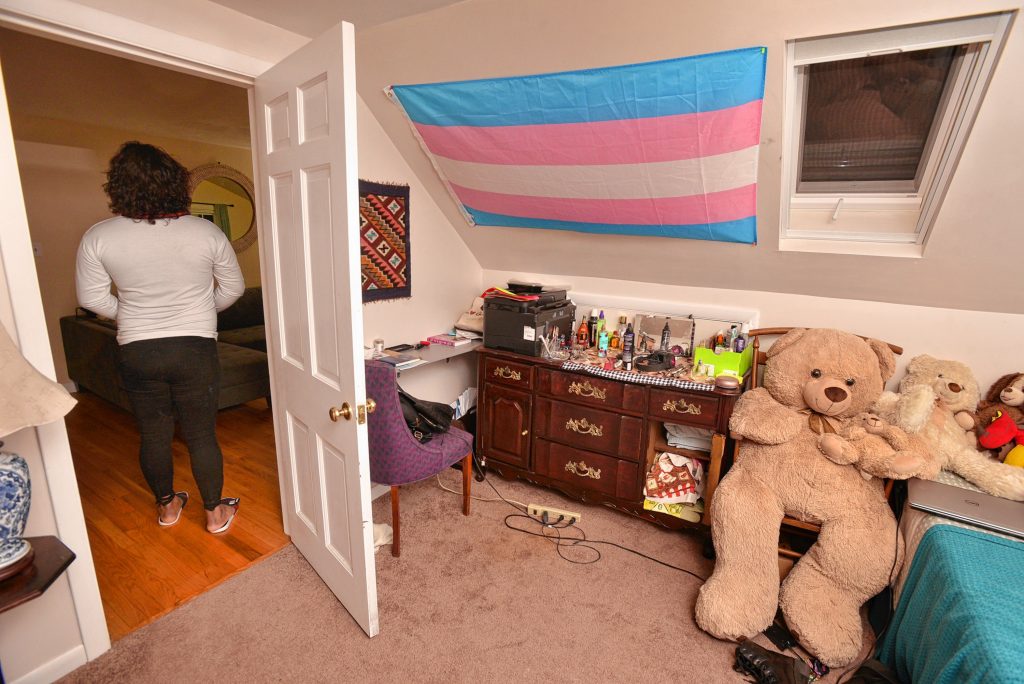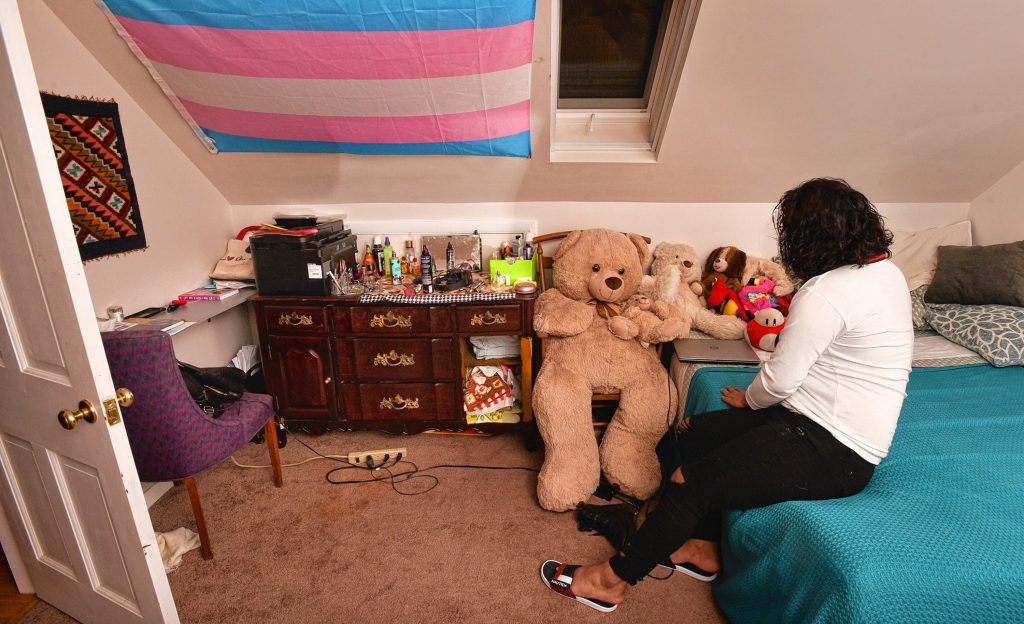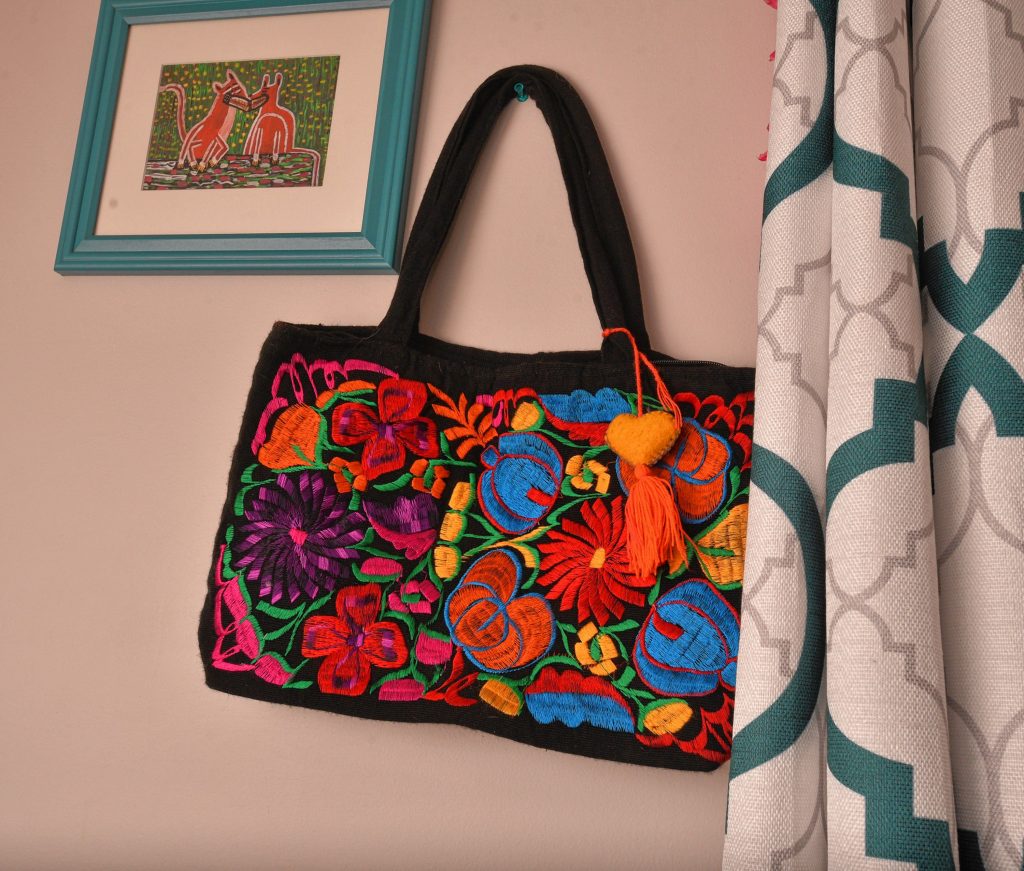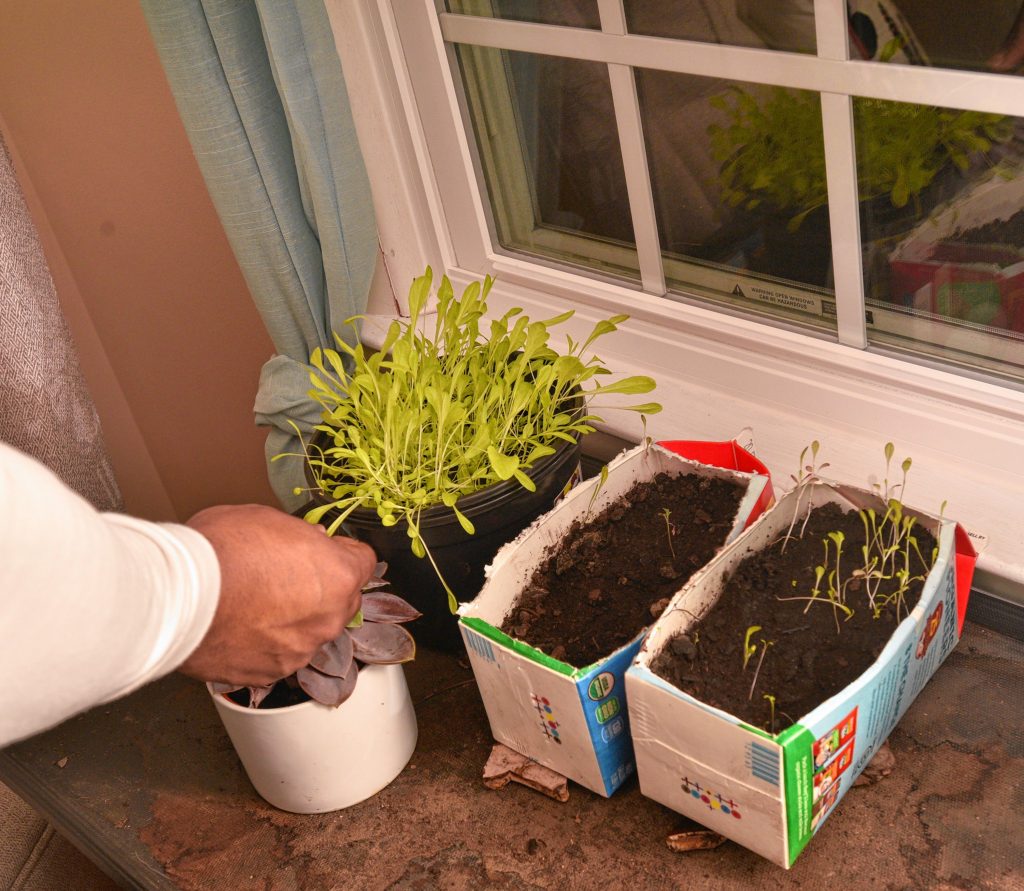Editor’s note: Due to the dangers facing those seeking asylum and their families in their home countries, as well as the sensitive natures of their legal cases, the Advocate is using pseudonyms Natty, Eva, and María for asylum seekers featured in this story and refraining from naming their countries of origin.
Transgender women Natty and Eva came to the United States in search of asylum because their identities made them targets of violence from gangs, police, and their nations’ governments.
They’ve been subjected to sexual harassment and death threats in their home countries, and they felt they had no option but to come to the United States in the hope of finding a greater sense of security.
“I had to immigrate to Mexico three years ago because my life was in danger,” said Natty, who eventually made her way to the U.S.-Mexico border last year. “There were many times where I was at the point of being assassinated for being trans. In my country, it’s not acceptable to be trans in the community.”
A local network of volunteers and organizers, called the Trans Asylum Seeker Support Network (TASSN), was formed in early 2019 to help transgender asylum seekers like Natty and Eva get out of detention and build a supportive community in the Valley. The volunteer group fundraises for the numerous fees associated with the asylum process, finds sponsors to house asylum seekers, and provides “trauma-informed” support, according to founder Alla Sonder, an Amherst resident.
“Supporting trans and queer asylum seekers is a very different project than supporting straight or English speaking asylum seekers,” said Sonder about the work of the western Massachusetts-based group. “They have a lot more trauma. They have to work a lot harder to find community. There is a lot of transphobia in Latin communities.”
The Western Massachusetts Asylum Support Network (WMASN), a subject of the second installment of this series, is in close collaboration with the TASSN, but the two operate independently, according to Jonathan Jenner, a lead organizer with the WMASN. The groups often work together and there are volunteers who overlap between networks, but the two are separate entities.
Natty arrived from Central America; Eva from the Caribbean. Under U.S. law, asylum status may be granted to migrants belonging to persecuted social groups. As transgender women, both believe they deserve legally protected status in the U.S. because of the persecution they experienced in their home countries — and they fear for their lives should they be forced to return.
Now residing in western Massachusetts, both women are among a handful of trans asylum seekers living in the Valley attempting to secure a foothold in a new and different country. Neither Natty nor Eva speak English and interviews with the Advocate were conducted in Spanish.
Natty is currently taking English classes and says the TASSN has connected her with other trans asylum seekers living in the area and has provided a lot of emotional support since moving to the Valley. Her asylum case is still pending and her next immigration court hearing is in the fall.
Eva arrived in the Valley in March after being in detention for two months in Arizona and received a sponsorship through the TASSN.
‘My family rejected me’
Both Ramon and Santiago, subjects of the first installment of this series, fled their home countries after facing death threats initiated by their nations’ authoritarian governments. Natty faced discrimination from her family, gangs, and police on the basis of her identity, and was forced to leave at the age of 19 for Mexico and then the United States for fear of her life.
“My family rejected me and left me to the streets because it is a humiliation for a family to have transgender members,” Natty said. Her mother had died when she was young, and her father told her to survive on the streets because, “You are not family of ours,” Natty recalled him saying.
For three months in 2016, she slept on a nearby beach in her country in Central America. Police would abuse her, verbally and physically, and there were criminals who would also attack her for being transgender. Religious people would hurl insults at her as well, telling her that she would be going to hell for her identity — they also threw bags of water at her.
Eventually, Natty was taken in by a neighbor — another transgender woman — and her neighbor’s father. But soon after, Natty began receiving death threats from a local gang syndicate, which had begun assassinating transgender women, according to Natty. A member of the gang showed up at the house Natty was staying at and demanded the equivalent of $2,000, to be paid in 12 hours, or else they would come back and kill her.
In the past, members of the same gang had beaten Natty with clubs and machetes, she said. Her hosts pleaded with the gang not to demand the money or kill her, but to no avail, so they gave Natty a small amount of money to leave the country.
Natty took a bus through Central America and found a place to live in a southern Mexican city in the state of Chiapas. A month later, the gang, failing to find Natty, killed the neighbor who housed her. Natty also heard about other murders across her town where transgender women were tied up and thrown into a river.
“That was what awaited me,” Natty said. “How they died is how I would’ve died … When the gang realized that we all wanted to leave the country, it was like they needed to assassinate us all at once before [we] could leave. It was like a single attack on the trans community. Only a few of us were able to survive because we’ve come to seek asylum in the United States.”
Discrimination from law enforcement
In Eva’s home country, she faced discrimination and abuse from many of the same entities as Natty did — from her father, from police officers, and from her peers.
Eva said she has developed trauma from police officers who have beaten her and a phobia of men due to past violent encounters. Even so, she said she participated in organizing a march for LGBT rights in her home country during the spring of 2019.
She recounted how one day, when she and fellow organizers were planning details of the march, police arrived and threatened them with violence if they did not stop the march from happening.
“We were in a room organizing — how we were going to do the march, sending out flyers, how many people we could expect,” Eva recalled. “And they (the police) came in and told us we could not do the march. If we did the march, they were going to intervene, and beat us. Or take us to prison, or even take our lives.”
Eva’s mother — one of the few people who supported her as a transgender woman — told her that she should leave the country because she feared for her life. Eva’s brother died and her mother couldn’t bear losing another child, said Eva, who did not want to talk about her brother’s death.
“She told me, ‘I need you to leave,’ ” Eva said.
She flew to Brazil, where she hoped to get asylum from the government. She said she was immediately denied and warned that if she did not leave the country, they would deport her back where she came from. Her passport showed a stamp entering the country and another stamp of her leaving a couple days later.
She traveled next to neighboring Uruguay. At first, she said she liked the country, until she met a man who stalked her and abused her, she said. Afraid of going to the police, she decided to travel through Central America and head to the U.S.-Mexico border.
Traveling through Mexico
Natty and Eva both experienced hardships while in Mexico. Natty had lived there for nearly three years before traveling to the border with the United States to attempt to gain entry and claim asylum. It took Eva from spring 2019 until January 2020 to arrive at the border.
In her time living in Mexico, first in Chiapas, then Oaxaca and Mexico City, Natty’s identity and immigration status kept her from getting legal work, and her safety was often in jeopardy.
While living in Chiapas, Natty worked in cantinas, or bars, as a bartender, a job she said she got through bribery. A public official would demand 500 pesos, or roughly $20, as a bribe in order to allow her to work, a common demand made of undocumented immigrants, according to Natty.
“He was taking advantage of our situation,” Natty said of the official.
After a year, she moved on to Oaxaca where she had to resort to sex work because she could not get any other work. She was violated and beaten, and even went to a police officer, who told her to return to her country.
“As an official, he was being an accomplice to the violation and abuse I suffered,” Natty said.
After this incident, Natty decided to continue north to Mexico City, where she attempted to find work in factories — unsuccessfully due to her immigration status. She said she had to “work on the streets” as a sex worker again, where she often saw “delinquency, people who robbed, beat people,” Natty recounted.
In September 2019, Natty arrived in Tijuana and waited for four months to be allowed into the United States. During her stay, she worked for a shoe shop that would set up in a city plaza.
In Tijuana, Natty met a volunteer assisting asylum seekers with the New York City-based New Sanctuary Coalition, who found a sponsor for Natty in western Massachusetts. The coalition had sent volunteers as part of a project called Sanctuary Caravan with the goal of supporting immigrants with the asylum seeking process. Through connections made at the border between a string of different organizations and volunteer groups, Natty met a resident in the Valley at the border who offered her a place to live once released from detention, which Natty agreed to.
Unable to wait
In December 2019, Eva had to cross the U.S.-Mexico border in Nogales, Mexico, to the border city of Nogales, Arizona, rather suddenly. Eva said a gang member in the Mexican city had kidnapped her and she had to cross the border one day to save her life.
At the time of her kidnapping, Eva was waiting to be admitted into the United States through the metering system where migrants have to wait for their number to get called to enter the country.
A gang member kidnapped her and tried to sexually abuse her, not knowing she is a transgender woman. When he found out, he demanded that she leave the city.
“I was violated,” Eva said. “I was traumatized by a man who belonged to the mafia. I was scared. Thank God he didn’t kill me.”
She continued waiting for her number to get called to be admitted into the United States while mostly staying indoors to keep the gang from finding her. One evening, walking back to where she was staying, she said she felt followed and decided she could not wait in Nogales anymore.
Eva crossed into the United States, ignoring the metering system because she was afraid for her life, and a border patrol agent found her. She was promptly detained in a facility in Arizona where she claimed fear of returning to her home country if deported.
Held in isolation
Throughout their time in detention, both Natty and Eva claim they were placed into solitary confinement due to being transgender.
Natty spent her first nine days in isolation in a detention center in California, where she said officials would toss bits of carrots, cookies, and sandwiches on the ground for her to eat. When she eventually got placed with the general population of immigrants detained, she said she saw thousands of people from all over the world housed there.
“Many were appealing their deportations,” Natty said. “Some have been there for two to three years.”
Eva, on the other hand, spent two months in detention. For the first week, she was placed in solitary confinement. Even though she would try to meditate while in solitary confinement, she said she would often scream and cry because of how awful she felt.
“I had never been deprived of my liberty for so long,” Eva said. “The discrimination I fled is what I found in detention.”
U.S. Immigration and Customs Enforcement (ICE), which manages and oversees the nation’s civil immigration detention system, did not respond to multiple requests for comment on conditions for transgender asylum seekers.
After she was taken out of solitary confinement, she made a friend who had connections with a non-profit, Transcend Arizona, a grassroots group supporting LGTB immigrants in detention. Through this non-profit, Eva got connected with Liza Neal, a resident in the Valley who became Eva’s sponsor.
Eva arrived in the Valley earlier this month and said she has felt liberated since arriving here. Her asylum case is still pending and she has her first hearing in the fall.
“Now I can feel free,” Eva said.
Last summer, Natty got released from detention after establishing a sponsorship and paying a $2,500 bond. She’s lived in the Valley since then, working through her asylum case, taking English classes, waiting out nearly six months before she can apply to get work authorization.
Asylum seekers can apply for permission to work 150 days after submitting an asylum application, according to U.S. Citizenship and Immigration Services.
“Right now, I am in the process of asking for asylum,” Natty said. “Life is a fight and I am always fighting. And as immigrants, we have to fight and demonstrate how strong we are.”
Building a support network
The Trans Asylum Seeker Support Network (TASSN) is a group of volunteers working in different capacities with the goal of creating a welcoming environment for asylum seekers and being a resource for immigrants navigating the various challenges of settling in a foreign country.
To date, the volunteer network has sponsored and housed seven asylum seekers, and there are four more in detention that the group is petitioning to have released and brought to the Valley — of those 11, Sonder said nine are transgender women and two that are gender-fluid.
The group began in early 2019 in response to a trans asylum seeker who received a sponsorship in the Valley, and whom the Advocate is calling María.
A local migrant right’s activist and organizer, Alla Sonder wanted to ensure that María had a support system in place that went beyond what a single sponsor could provide.
María declined to speak with the Advocate at her lawyer’s suggestion due to her asylum case, which is pending.
Organizing fundraisers, item drives, ride shares, and companionship circles were among the first efforts by Sonder to support María. From there, as more asylum seekers were being settled into the area, and learning of more transgender immigrants in detention in need of sponsorhips, Sonder said she realized the group would have to grow to be successful.
“There came a point around the end of summer where the network was becoming too much for me as an individual to try and manage the entire network of volunteers,” Sonder said. “And also, sponsors were getting very burnt out and the asylum seekers were needing more in-depth, structured support. So I decided to restructure the entire project so that it would be a series of non-hierarchical committees that each would have different responsibilities within the project.”
Sonder said there are 700 people signed up for the network’s newsletter — many who volunteer in various capacities — and a core group of 30 members who make up the various committees within the TASSN.
These committees are set up to address the individual needs of each asylum seeker: a finance committee to fundraise and bookkeep; a direct support committee of mostly Spanish-speakers to coordinate classes, ICE check-ins, court hearings, appointments, and companionship visits; an education committee for political analyses and tactics of the entire collective.
Volunteers in the broader network who subscribe to the newsletter often live busy lives themselves, Sonder said, and can only pitch in once a month, or every few months, with ride shares or monetary donations or other similar efforts.
“We are always in need of more volunteers than we already have,” Sonder said.
Within the TASSN, there is an inner group of volunteers who commit to being on a committee, hold monthly meetings, and as Sonder describes, “are very committed to the daily grind work of companionships and helping our compañeras build independence and life skills.”
“A lot of the trans women we support have never had a kitchen before, have never had a daily planner,” Sonder said. “Many have experienced homelessness, and many have no idea what this country is like. We help with building planning skills, learning English, and with cooking skills.”
The TASSN also connects asylum seekers with forms of healing such as psychiatry, therapy, and alternative healing, according to Sonder.
Providing emotional support for arriving asylum seekers is a priority for the network, according to a lead organizer Jax Padilla of Holyoke. Padilla facilitates direct support committees to ensure that asylum seekers are getting their daily, weekly and monthly needs met.
Additionally, Padilla makes sure to be available for one-on-one support.
“I provide a lot of companionship for women, and organize other people to get to know them and hang out,” Padilla said. “Most of them really love chatting in English, learning English, talking about their own stories.”
As for the greater network of volunteers, Sonder said monthly letters are sent out with a list of ways that people can volunteer, whether it’s for companionship time, for ridesharing, or simply fundraising.
An important aspect of the network’s broader goals, Sonder noted, are its revolutionary aims. The network is as “equally committed to the larger fights to abolish capitalism, abolish borders, and abolish imperialism,” she said.
This sets the TASSN apart from other non-profits and grassroots organizations working in refugee and asylum resettlement, Sonder said, adding that the network’s framework is of “revolutionary organizing, not just reformist organizing.” The group participates in protests and direct actions against the root causes that force asylum seekers to flee their country in the first place, according to Sonder.
“It’s important for us to hold a solidarity and not a charity framework to locate ourselves within the same systems of imperialism and capitalism that are affecting the asylum seekers and view our work as building comradeships and relationships that transcend borders,” Sonder said.
A ministry alliance
Just as María had inspired Sonder to form the TASSN, another local woman who had gone to the southern border in January 2019 decided independently to find ways to support asylum seekers at the border, in detention, and locally.
Liza Neal, a Valley resident and a spiritual director with South Church in Amherst, is working with ministers in the region to purchase a home for asylum seekers. The alliance is also currently looking for an apartment for asylum seekers waiting to be released from detention and for a few who are already living in the Valley with sponsors.
Neal is also the sponsor for Eva.
“We wanted to form a caring community with her,” Neal said of María. “And to be able to help her thrive and heal and have good legal representation, good medical care, and then at the same time, I am getting calls from people in detention, and we need to do more than just support this one person.”
Neal had traveled down to the southern border as part of the New Sanctuary Coalition project where she spent time with asylum seekers attempting to enter the United States.
“It was an incredibly intense experience,” Neal said of being in Tijuana. “There were people from everywhere, all over the world. All kinds of people of all ages.”
Neal recounted how her experiences at the border were both inspiring and incredibly hard to cope with. She said she saw immigrants — many of whom had suffered in their home countries and had taken perilous journeys — who still had so much hope. Seeing fathers with their 2-year-olds was difficult, Neal said, because they would very likely be separated once admitted into the country.
Coincidentally, Neal met María’s sponsor from Holyoke in Tijuana one day. Later in February, as Neal kept in touch with the sponsor and traveled to western Massachusetts, Neal decided to become involved.
“As she took a bus across the country from detention to here, we organized folks from churches to meet her at each bus change,” Neal said.
Neal formed the Trans Asylum Seekers Ministry Alliance, with support from Edwards Church in Northampton and the United Congregational Church in Holyoke, to fundraise for asylum seekers and find sponsors. To date, the alliance has supported 10 transgender asylum seekers, both in the Valley and attempting to reach the area, some who have also been supported by the TASSN, according to Neal.
“For those in detention, it’s talking on the phone, money so they can make calls, sending letters and books.” Neal said. “For those who are on the way here, it’s providing connection to folks on the way, money for transportation. For those who are here, it’s housing, rides, and connecting them to medical care and legal advocacy.”
The group is fundraising for the home and apartment for transgender asylum seekers through various churches, art auctions, and individual donations. A Buddhist priest even walked The Camino de Santiago — a historic pilgrimage hundreds of miles long in Spain — with people pledging donations for every mile walked.
Reverand Vanessa Cardinale of South Church said the work around supporting transgender asylum seekers is an extention of the church’s commitment to being welcoming to immigrants. Vanessa said she views her role within the ministry alliance as a supportive one, often being a translator and a listening ear for sponsors in the Valley and immigrants who can only speak Spanish.
“There is a lot of trauma that folks who are coming up have lived through, and maybe for the first time in their lives, are beginning to process because they have the space to,” Cardinale said.
Impact of coronavirus
As communities across the globe struggle with an ever-changing landscape of uncertainty as nations attempt to contain the new coronavirus, locally it’s forced many asylum seekers indoors, left some in detention unsure when they will be released, and made keeping track of court dates more difficult.
“It’s had a huge impact,” Neal said. The search for an apartment for asylum seekers has become more challenging with landlords wary of making appointments. Sponsors with varying degrees of Spanish-speaking abilities, who often rely on volunteers to help communicate, are attempting to explain the situation to their immigrant guests. English classes have either been canceled or are going virtual.
The financial duress of the epidemic has been widely felt across the country, and local sponsors are not exempt.
“I had a sponsor who was ready to take someone, and they then said, ‘I don’t know my financial situation,’ and had to put their sponsorship on hold,” Neal said.
It is unclear whether an asylum seeker who is in detention in Colorado — and was about to be released — will still be allowed to leave, according to Neal. And even if they are allowed to leave, whether or not they will be allowed to travel on an airplane is another unanswered question.
For those with cases in immigration court, there is a phone number that can be called with updates to cases, Neal said, but it is often not updated regularly enough to keep up with the constant changes.
“It feels precarious,” Neal said.
As for the impact on the TASSN’s work, Sonder said many of the network’s volunteers are remotely providing companionship through mobile apps and video chats.
“With social distancing, we are trying to provide companionship via video chat,” Sonder said. “In terms of financial support, people aren’t making as many donations as much right now.”
Sonder added that many of the organizers in the network have become participants and leaders in mutual aid efforts in response to the epidemic, efforts which the network had already laid the groundwork for.
“Engaging in the organizing and mutual aid work for the network for the past year has thoroughly prepared many of us to smoothly and truly transition into, and lead efforts, to engage in mutual aid and organize responses to COVID-19,” Sonder said. “It’s crucial that all of us organize around rent freezes and rent strikes, moratoriums on evictions, for universal basic income, and mass unemployment benefits.”
Settling into the Valley
At the end of February, Eva was released from detention and began living with Neal, her sponsor. Eva had gotten connected to Neal through Transcend Arizona and the Sante Fe Dreamers Project, which provides free legal services to immigrants.
Volunteers with the TASSN went to pick up Eva and on their first night and went out dancing. The TASSN held a party for Eva the following week and introduced her to other asylum seekers.
“Asombrada. Maravillada,” were just a few words Eva used to describe how she felt about the party dedicated to her arrival, meaning “amazed” and “astonished.”
She continued, “It’s the first time there is a party for me like this. It’s something I could never have imagined. I spent my birthday crying in detention. Como se dice: Oh my God!”
Natty said that although life is difficult since she cannot work yet and her asylum case won’t get its first hearing until the fall, she feels like she has an opportunity to be herself in a way she never has before.
“Having my gender identity is something so momentous that I can’t even describe,” Natty said. “To have my gender that I identify in an environment of people that is totally different. I feel safe and secure. But no matter what, my past is not erased. All the sexual abuse, the beatings, everything that I’ve suffered, all of my friends that have been murdered without justice. All this still affects me.”
Luis Fieldman can be reached at lfieldman@valleyadvocate.com.

